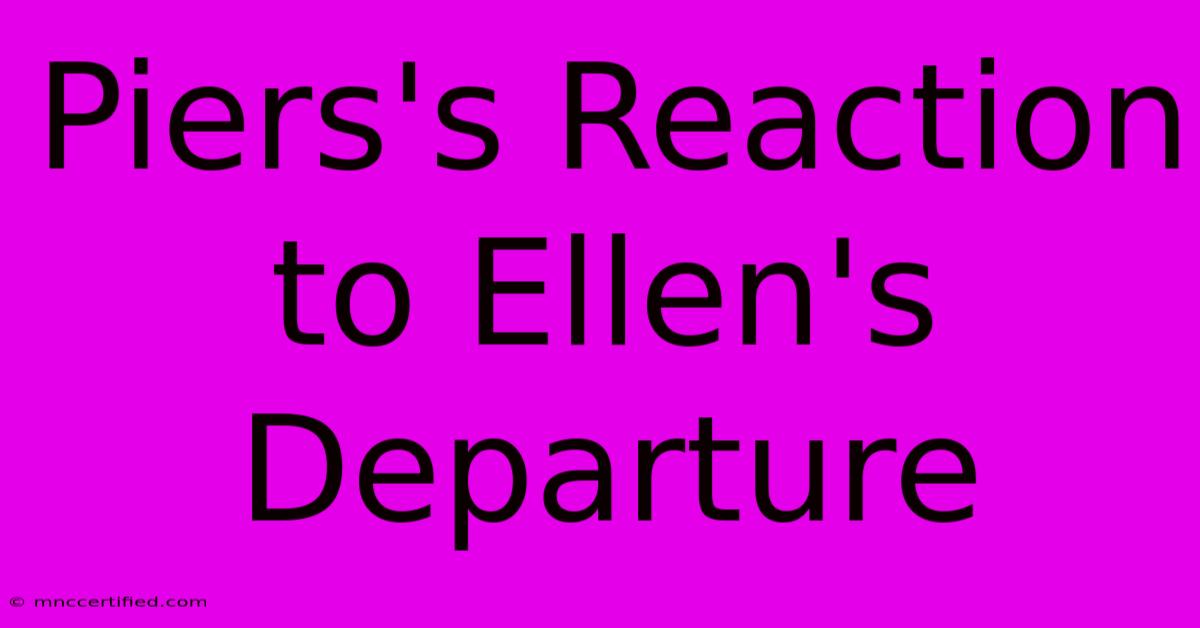Piers's Reaction To Ellen's Departure

Table of Contents
Piers Morgan's Reaction to Ellen DeGeneres' Departure: A Controversial Farewell
Ellen DeGeneres' departure from her long-running talk show, The Ellen DeGeneres Show, sent shockwaves through the entertainment industry. The announcement sparked a flurry of reactions, and among the most highly publicized and controversial was that of Piers Morgan. This article delves into Morgan's response, analyzing its context and examining the broader implications of his commentary.
A History of Public Feuding
Before analyzing Piers Morgan's specific reaction, it's crucial to understand the pre-existing tension between him and Ellen DeGeneres. Their relationship has been characterized by a long-standing public feud, marked by sharp disagreements and televised clashes. This history provides vital context for understanding the nuanced nature of Morgan's response to DeGeneres' exit. Their disagreements often centered around political viewpoints, with Morgan frequently criticizing DeGeneres' perceived liberal stances and activism.
The Toxic Workplace Allegations
DeGeneres' departure wasn't solely driven by personal choice. The show faced significant scrutiny following allegations of a "toxic workplace" culture. These allegations, involving claims of harassment and bullying, significantly impacted the show's reputation and contributed to its eventual cancellation. This backdrop significantly shaped the public's perception of DeGeneres' departure and how figures like Piers Morgan reacted.
Piers Morgan's Response: A Mix of Schadenfreude and Criticism
Piers Morgan's reaction to Ellen DeGeneres' departure wasn't a simple expression of sadness or sympathy. Instead, it was a complex mix of reactions, often interpreted as exhibiting a degree of schadenfreude alongside more pointed criticisms. He used his various platforms, including social media and television appearances, to express his views. Many interpreted his commentary as capitalizing on the controversy surrounding the show's alleged toxic workplace environment.
"I Told You So" Mentality
Many observers noted a distinct "I told you so" undertone in Morgan's comments. He had previously been critical of DeGeneres and her show, highlighting what he perceived as hypocrisy and inconsistencies between her on-screen persona and behind-the-scenes reality. His response to the departure seemingly served to reinforce his prior criticisms and validate his perspective.
Criticism of DeGeneres' Legacy
Beyond the element of schadenfreude, Morgan also offered criticisms of DeGeneres' overall legacy and impact. He questioned the sustainability of her brand and the long-term effects of the controversy on her public image. This critique extended beyond the immediate context of the show's cancellation, touching upon broader questions about celebrity culture and accountability.
The Public's Reaction to Morgan's Response
Piers Morgan's reaction, unsurprisingly, sparked a significant backlash. His comments were widely criticized by many who viewed them as insensitive and opportunistic. Others defended his right to express his opinion, even if it was unpopular. This division highlights the ongoing polarization of public opinion surrounding both DeGeneres and Morgan themselves.
The Broader Implications
Piers Morgan's reaction to Ellen DeGeneres' departure serves as a case study in the complexities of celebrity culture and public discourse. It highlights the intricate relationships between media personalities, the power dynamics at play, and the enduring impact of controversy on public perception. The episode underscores the need for nuanced understanding and critical analysis when evaluating high-profile events and the reactions they generate. It also reflects the complexities of cancel culture and the challenges of maintaining a consistent public image in the age of social media.
SEO Keywords:
- Piers Morgan
- Ellen DeGeneres
- Ellen Show Cancellation
- Toxic Workplace
- Piers Morgan Reaction
- Ellen DeGeneres Controversy
- Celebrity Feud
- Media Controversy
- Public Reaction
- Cancel Culture
This article aims to provide comprehensive coverage of the topic, incorporating a variety of keywords naturally within the text to improve its search engine optimization (SEO). The use of headings, bold text, and a clear structure enhances readability and user experience. Further off-page SEO strategies, such as building backlinks from relevant websites and engaging in social media promotion, would further enhance the article's online visibility.

Thank you for visiting our website wich cover about Piers's Reaction To Ellen's Departure. We hope the information provided has been useful to you. Feel free to contact us if you have any questions or need further assistance. See you next time and dont miss to bookmark.
Featured Posts
-
Bobo And Toast At Hey Bobo Cafe
Nov 22, 2024
-
Captain Tom Village Disowns Tarnished Legacy
Nov 22, 2024
-
Ilms Impact On Alien Romulus
Nov 22, 2024
-
Preferred Insurance Three Rivers
Nov 22, 2024
-
Bengals Vs Steelers Linebackers Bold Claim
Nov 22, 2024